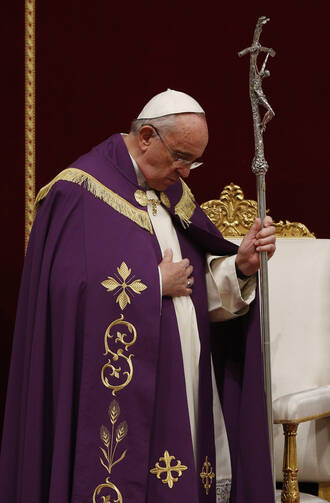In a surprising and far-reaching decision, Pope Francis announced an extraordinary holy year, a Jubilee of Mercy, that will extend from Dec. 8, 2015, to Nov. 20, 2016, and will involve the Catholic Church throughout the world. He broke the news during a penitential celebration in St. Peter’s Basilica on the evening of March 13, the second anniversary of his election as bishop of Rome.
The surprise announcement was greeted with warm applause. Pope Francis said he is “convinced that the whole church can find in this jubilee the joy of rediscovering and making fruitful the mercy of God, with which we are all called to give consolation to every man and every woman of our time.”
Pope Francis will open this 30th jubilee in the history of the church on the 50th anniversary of the closing of the Second Vatican Council and just over a month after the closing of the October gathering of the Synod of Bishops on the Family.
A jubilee year is a great religious event that originated in Judaism and was linked to universal pardons and reconciliation. As the Book of Leviticus tells us (25:8-13), it was celebrated every 50 years; slaves and prisoners were freed, debts were forgiven and God’s mercy was made more manifest. The church revived that tradition in the year 1300 under Pope Boniface VIII. Since then there have been 29 jubilees, or holy years.
Francis has been called the pope of mercy ever since his election on March 13, 2013. He has frequently proclaimed to the world the God of mercy, who wants to save people, not to condemn them. It was the central theme of his first Mass for the public in the Church of Sant’ Anna in the Vatican on March 17, 2013, and of his midday talk to the almost half million people who gathered in and around St Peter’s Square that same day, when he praised Cardinal Walter Kasper’s book on the topic of mercy. It is a theme that has surfaced again and again in his talks and homilies throughout the past two years.
“I believe that this is the season of mercy,” Francis told journalists on the flight back from Rio de Janeiro, July 28, 2013. “The church is a mother: she has to go out to heal those who are hurting, with mercy,” he stated. “If the Lord never tires of forgiving, we have no other choice than this: first of all, to care for those who are hurting.”
Pope Francis insisted on the need to show mercy in his homily to the new cardinals on Feb. 15, when he concelebrated Mass with them in St. Peter’s Basilica. He recalled then that “the church’s way, from the time of the Council of Jerusalem, has always been the way of Jesus, the way of mercy and reinstatement.
“The way of the church is not to condemn anyone for eternity,” Pope Francis said. “It is to pour out the balm of God’s mercy on all those who ask for it with a sincere heart.”
He expressed the same concept even more succinctly in a letter commemorating the centenary of the Catholic University of Argentina in Buenos Aires in March, when he wrote: “Mercy is not just a pastoral attitude; it is the very substance of the Gospel message.”
Now he is taking this message a step further, with his decision to proclaim a jubilee year. The Vatican said he will issue the bull formally proclaiming the jubilee on the Second Sunday of Easter, also known as Divine Mercy Sunday, April 12, and place it on the front of the Holy Door in St Peter’s Basilica.








